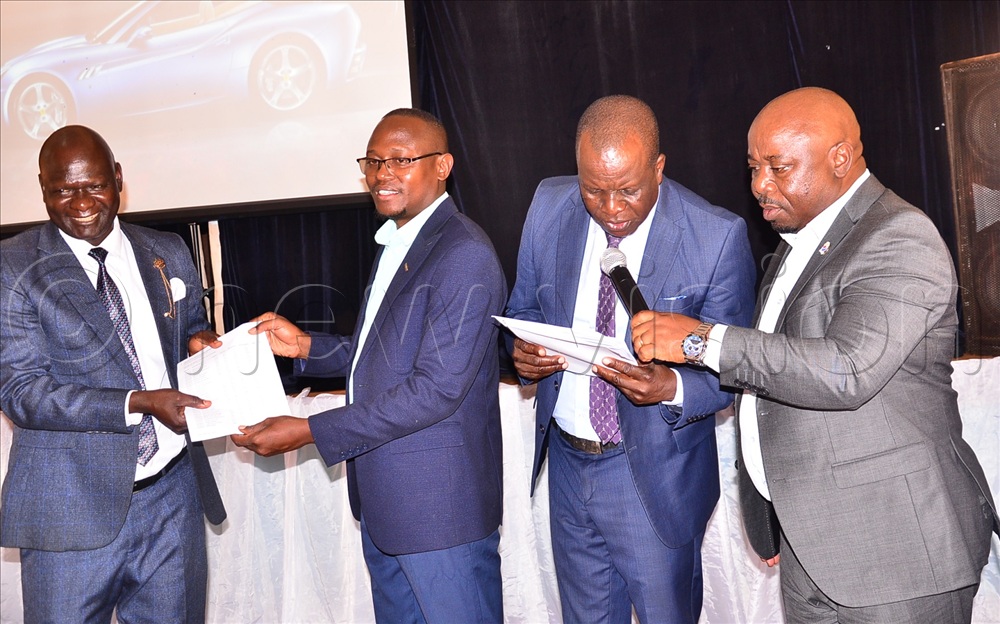Jinja officials alarmed as nearly 200 pupils drop out before PLE
By August this year, Baliraine said, of the 6,013 candidates registered between April and May, 189 had dropped out, comprising 98 boys and 91 girls.
Jinja city education officer Paul Mugaju Baliraine speaking at the release of the mock results at Victoria Nile School in Jinja city recently. (Photos y Jackie Nambogga)
_______________
Jinja city education officer Paul Mugaju Baliraine has expressed dismay over the rising number of Primary Seven dropouts ahead of the 2025 Primary Leaving Examination (PLE).
By August this year, Baliraine said, of the 6,013 candidates registered between April and May, 189 had dropped out, comprising 98 boys and 91 girls.
He made the remarks during the release of the 2025 mock exam results on October 28, 2025, at Victoria Nile Primary School, where 116 schools took part in the exercise.
However, Baliraine feared that the number was likely to rise between August and November as candidates sit their final PLE.
He lamented to city mayor Alton Kasolo Okocha and the new city clerk Moses Otimong about the 3.1% dropout rate recorded within three months, saying it could lead to an increase in hooliganism and theft in the city.
“What is going to happen while not sitting their final PLE, and I don’t want to take this for granted, these are future hooligans and thieves we shall see in the city,” he noted.
Kasolo wondered whether teachers were taking the trouble to inform their headteachers about absentee learners.

Livingstone Mbago (L) the Victoria Nile headteacher recieving a certificate from Kasolo as Baliraine (R) aided Otimong to announce the best schools in mock in Jinja city.
He promised to purchase motorcycles for school heads to improve mobility and said the education sector was underfunded, relying on limited local revenue to come up with innovations, which remained a major challenge.
Meanwhile, city clerk Moses Otimong urged school heads to work closely with village LC1 chairpersons to trace the missing learners.
He explained that the academic excellence of any school largely depends on its headteachers and teachers, saying results reflect their quality and are crucial in determining a school’s strategic direction.
Even if girls became pregnant or boys turned to boda-boda riding or sugarcane cutting, Baliraine urged headteachers to locate them and encourage their return to school, saying no child should be denied a chance to sit for PLE.
According to Stephen Kagoda, the city inspector of schools, a total of 264 pupils passed in Division One, 1,711 in Division Two, 1,514 in Division Three, and 1,110 in Division Four. A total of 1,225 failed, and 189 did not sit.
Although boys outperformed girls in Division One (134 to 130), Kagoda said the girls put up a spirited fight in Divisions Two and Three, while the boys followed in Division Four.
He added that while more girls sat the exams, many struggled to achieve passable grades, with a higher failure rate of 702 compared to 523 boys.
Baliraine cautioned headteachers against denying learners the chance to sit exams because of poor grades, warning that it was a criminal offence under the UNEB Act.
“Denying a chance to a child who registered for PLE is criminal under the UNEB Act; let us not deny them on the basis of poor grades, these are their results,” he urged.
While the government’s education policy focuses on three key tenets — access, retention and completion — Baliraine questioned why the dropout rate remained high, particularly in government-aided and UPE schools.
He said children should be able to access education, especially at the primary level, and that schools are expected to provide a conducive environment for their stay.
He added that this is why classrooms are built, leaders are deployed, and co-curricular activities are promoted.
Once children join Primary One, they should be retained until completion, and upon joining Senior One, they should progress to Senior Four and Six.
He emphasised that Uganda’s education aims to produce competent individuals capable of thriving in society under the new lower secondary curriculum that promotes values.
Kagoda said Social Studies (SST) remained the worst-performed subject, with only 61 distinctions — 35 of them by girls.
Out of 126 distinctions in Science, 69 were scored by boys. In Mathematics, the second-best subject, boys also led with 85 distinctions, while girls had 43.
In English, girls excelled with 304 distinctions compared to 128 for boys.
Overall, 2,388 candidates attained between C3 and C6, followed by 2,438 in English, 2,094 in Mathematics, and 1,730 in SST.
Most pupils attained Pass 7 to 8, with 2,561 in Mathematics, 2,315 in SST, 2,209 in Science, and 1,207 in English.
Although English was the best-performed subject overall, it recorded the second-highest failure rate (F9) with 1,842 candidates, behind SST with 1,889. Science and Mathematics followed with 1,390 and 1,230, respectively, representing 32% of the learners who failed all subjects.
These results highlight the need for focused remedial teaching, strengthened foundational skills, and intervention programmes, particularly in literacy and numeracy, to improve learner outcomes.
The ten best-performing schools were recognised, with only two government schools among them, Victoria Nile Primary School, which ranked first, and Magwa Primary School, which placed tenth. The remaining eight were private schools.